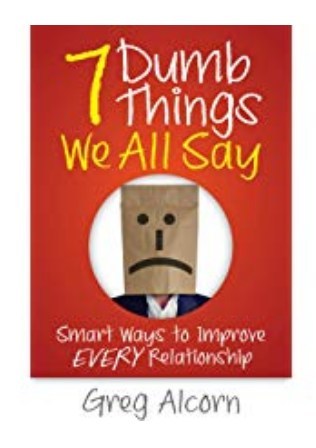SALISBURY, N.C., Feb. 4, 2019 /PRNewswire/ — Nobody wants to say dumb things, but we all do.
“The first step in fixing common communication blunders is to know what those blunders are,” says Greg Alcorn, author of 7 Dumb Things We All Say: Smart Ways to Improve Every Relationship (2019, www.indiebooksintl.com). “That’s how you can say something the smart way and not the dumb way.”

Alcorn is the CEO of Global Contact Services (GCS) of Salisbury, NC. His company has 1,000 employees and averages 30,000 customer service conversations every day.
GCS, which Alcorn founded in 2001, serves retail, insurance, financial and government clients. His company provides clients with outsourced staffing and management for customer interactions, such as customer service call centers.
“I have run customer service call centers for 30 years and I have listened in on million calls,” says Alcorn. “In that time, I have made and I have heard countless conversation blunders.”
Here are Alcorn’s top seven conversation blunders:
- Using Bad Bookends. The first and biggest blunder is starting and ending what you say with the wrong phrasing. Conversation bookends are the small comments or questions just before or right after a full statement or request for action. Be better with your starting and ending bookends.
- Starting with Wrong First Words. The second biggest blunder is starting off wrong with the first few words. Are you familiar with the adage, “Getting off on the wrong foot”? Conversations have first impressions, and they begin with your first three words. Hint: one of the words should be the other person’s name.
- Not Choosing Your Words Well. The third biggest blunder is choosing negative words over positive words. The words you choose paint a picture for the listener. Your words express your attitude and your personality. Keep it positive. Don’t start a sentence with the word “no.”
- Poor Questions and Bad Listening. The fourth biggest blunder is the poor use of mouth and ears. Meaningful questions always stay on subject, keep a conversation moving forward, and ensure the other person feels heard and understood. Becoming a better listener is easier than you might think. It starts by committing to be a great listener and making an active choice to listen. Ask good questions and really listen. This is the “You have two ears and one mouth” principle.
- Focus-on-Me Attitude. The fifth biggest blunder is to have a me, me, me attitude. Making it all about you is a turn off for them. Take the I and me statements out of your conversations and put in the word you. This is not a technique, this is an attitude.
- Wrong Tone. The sixth biggest blunder is not saying your words with the proper tone of voice. People feel more comfortable with pleasant, variable tone quality. Voice tone is made up of rate, pitch, and volume. Think tone and don’t drone.
- Not Diffusing Difficult Drama. The seventh biggest blunder is creating drama or letting drama escalate. Stressful conversations, or drama, can be avoided by mastering word selection, listening, and questioning skills. Drama can be inevitable, however. Most stressful situations can be defused when you apply the three Rs: recognize, restate, and reassure. Ask others: “What would you like to see happen?”
In addition to running a company and being an author, Alcorn and his wife, Missie, are the founders of ApSeed, a privately funded pilot program that works to expose at-risk children to books and literacy tools to help them be kindergarten-ready.
About Indie Books International
Indie Books International (www.indiebooksintl.com) was founded in 2014 in Oceanside, California by two best-selling business authors. Since then the company has released more than 100 titles. Similar to indie film companies and indie music labels, the mission of Indie Books International is to serve as an independent publishing alternative for business thought leaders.
Contact:
Henry DeVries
[email protected]
619-540-3031
SOURCE Indie Books International
